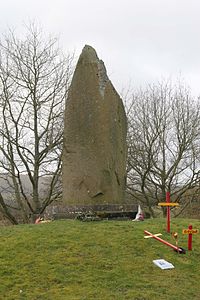Battle of Orewin Bridge
| Battle of Orewin Bridge | |||||||
|---|---|---|---|---|---|---|---|
 The Llywelyn Monument at Cilmeri which marks the battle of Orewin Bridge |
|||||||
|
|||||||
| Belligerents | |||||||
|
|
|
||||||
| Commanders and leaders | |||||||
|
Roger l'Estrange John Giffard Edmund Mortimer Gruffydd ap Gwenwynwyn Owen de la Pole |
Llywelyn ap Gruffudd † | ||||||
| Strength | |||||||
| 5000 Infantry 1300 Heavy Cavalry |
7000 Infantry 160 'Teulu' (Household) |
||||||
| Casualties and losses | |||||||
| Unknown | Around 2000 | ||||||
The Battle of Orewin Bridge (also known as the Battle of Irfon Bridge) was fought between English (led by the Marcher Lords) and Welsh armies on 11 December 1282 near Builth Wells in mid-Wales. It was a decisive defeat for the Welsh because their leader, Llywelyn ap Gruffudd was killed, and this effectively ended the independence of Wales.
Llywelyn had already fought a war against Edward I of England in 1277. Edward had organised a large full-time army with which he overran all North Wales as far west as the Conwy River, and a fleet with which he captured Anglesey, depriving the Welsh of much of their grain. Llywelyn was forced to come to humiliating terms, and ceded large areas of Wales to England.
Over the five years which followed, there was continued tension between Llywelyn and Edward over various lawsuits, and increasing unrest between the Welsh people and their English administrators in the newly transferred areas. The revolt was actually begun in 1282 by Llywelyn's treacherous brother Dafydd, who had sided with Edward five years earlier but now captured Hawarden Castle and slaughtered its garrison. This was followed by uprisings in many parts of Wales, and Llywelyn declared war on Edward on behalf of all Welsh.
Edward repeated his tactics of the previous war, laboriously occupying North Wales as far as the Vale of Conwy and occupying Anglesey, while sending armies into southern and central Wales to overawe or subdue Llewelyn's allies and potential supporters. At the Battle of Llandeilo Fawr the English army attacking south Wales was ambushed and destroyed by the southern Welsh. On 6 November, Edward's lieutenant in Anglesey, Luke de Tany, launched a premature attack across a bridge of boats which spanned the Menai Strait. His force was ambushed, cut off and slaughtered at the Battle of Moel-y-don.
...
Wikipedia
